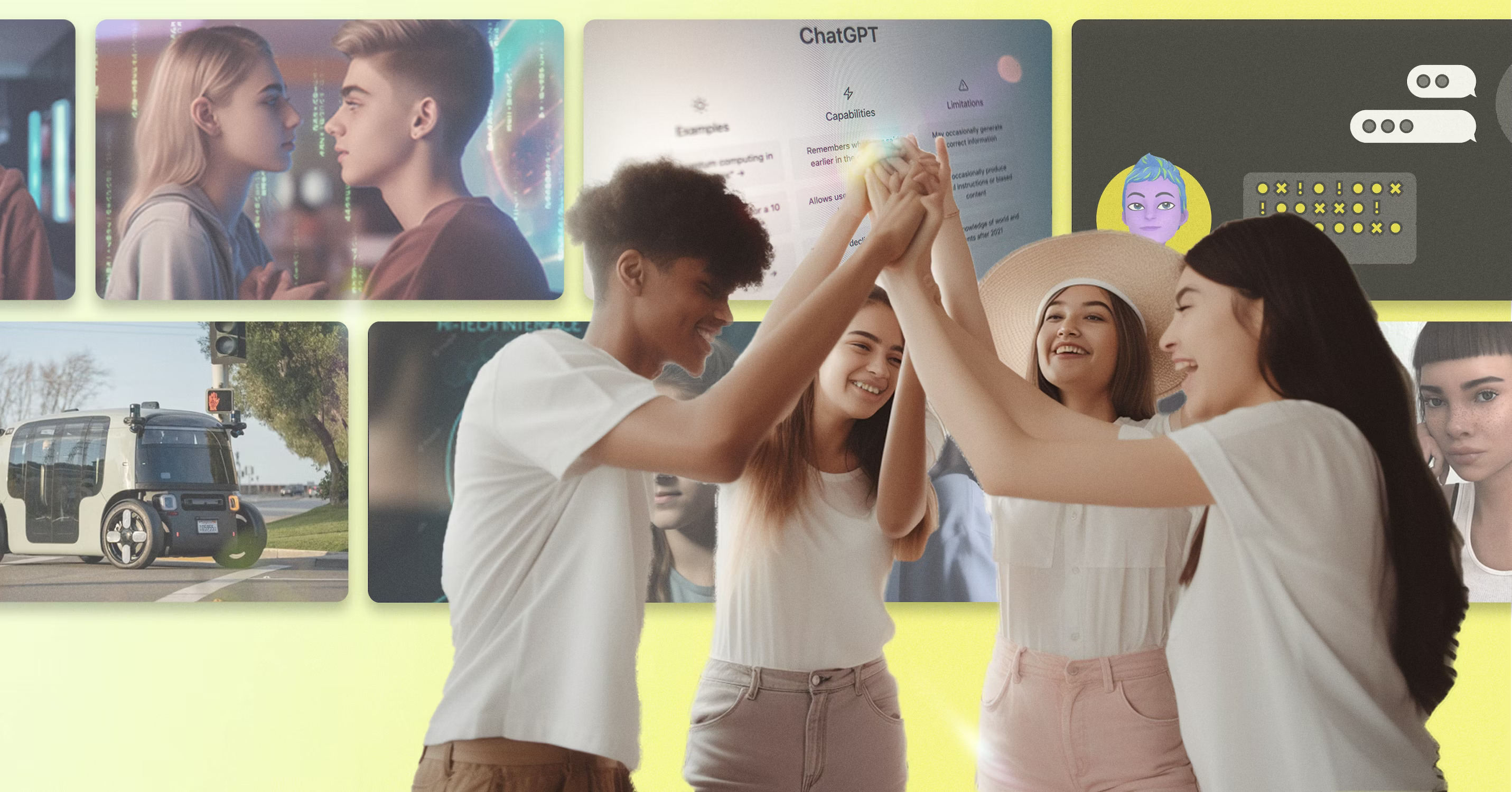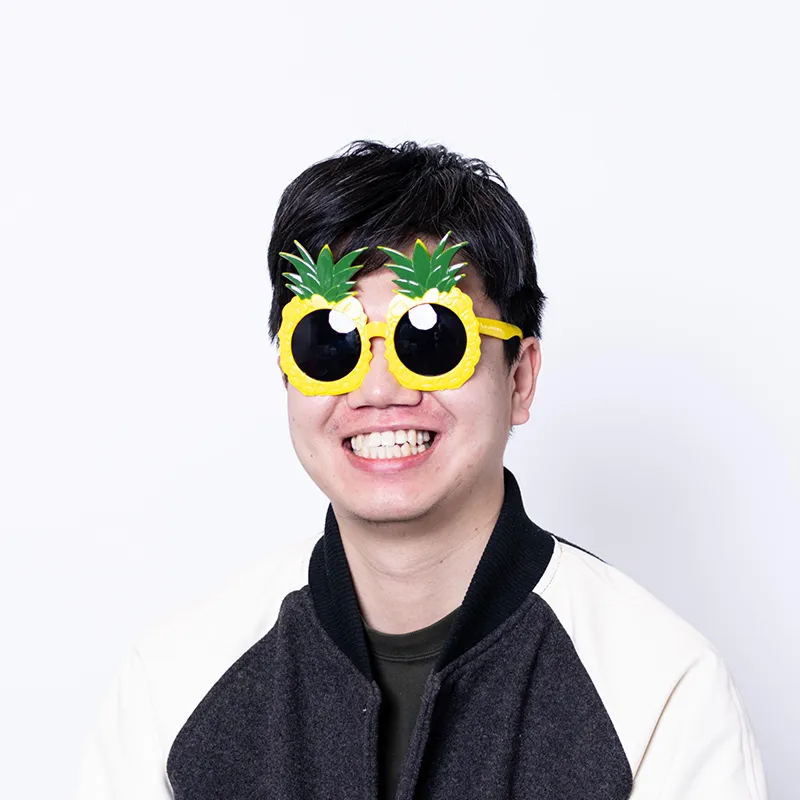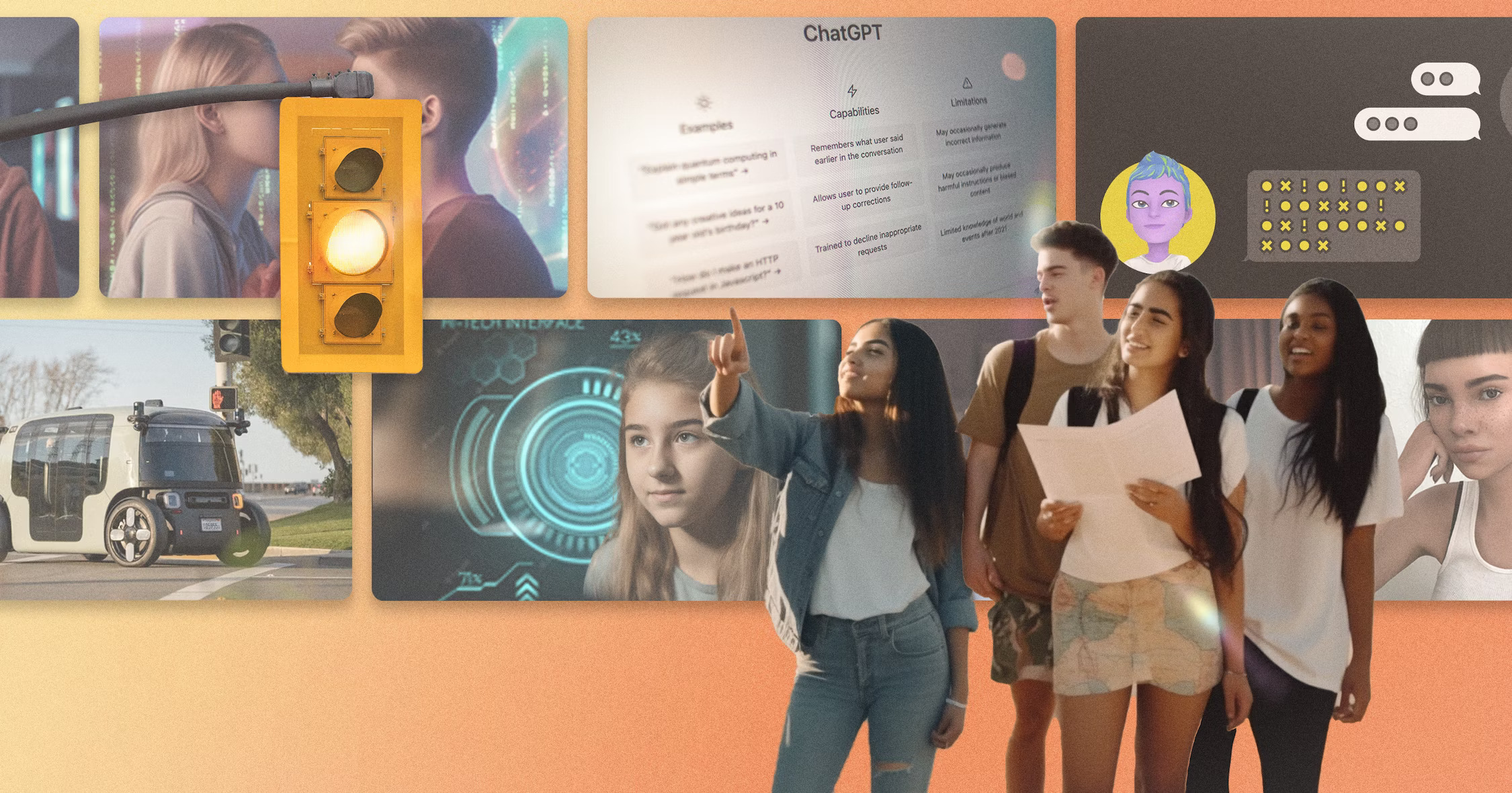Will AI interfere with relationships?

Earlier this year, Snapchat introduced My AI, a relentlessly cheerful chatbot powered by OpenAI’s GPT technology. The avatar, pinned to the top of your chat feed, was ready to respond to every passing thought, be your 24/7 rant buddy, or even…your new best friend.
You might imagine that Gen Z, cradled by the arms of technology from their earliest friendships found on Club Penguin or Minecraft, would welcome My AI. After all, this is a generation for whom dating starts with the subtle “like” of a post or in the DMs of a swiped-up Instagram story.
But in a surprising twist, Snap’s chatbot was an instant flop, resulting in a spike of 1-star reviews.
That tracks with the responses of the 13- to 21-year-olds we spoke to, all of whom voiced a resounding “no” to the idea of AI infringing upon their relationships. Rather than forming attachments to the programmed responses of AI, they are interested in cultivating genuine bonds with others that don’t require an algorithmic intermediary.
“How does this change our expectations of real life people?” asked one 19-year-old. “I feel like that could be super problematic for friendships because you're like, oh, I just want this person to be different. Why can't they talk like this? Why do they laugh like this? Why can't they understand this? Why don't they know everything about me? Why can't they read my mind?”
Young people already feel the damage social media has had on their relationships and mental health. And they're wary that AI will interfere with the relationships they’re just learning to foster.
Meanwhile, brands are in an arms race to create AI companions and AI clones that can be integrated into products and services. But when our team put a series of hypothetical Gen AI-powered relationship products in front of a group of young people, they balked and even expressed discomfort. They want technology that augments human relationships, not bots that replace them.
These insights led to three principles that we’re using as guideposts as we design this space.

1️⃣ Skip the engineered reality; reflect authenticity
Perfect, personalized AI bots might breed dissatisfaction with flawed human friends. Plus, they’re just plain spooky. Gen Zs told us they would prefer tools designed to help them embrace the imperfections of relationships and help them navigate. “I don't like the idea of being able to mold someone,” one respondent told us. “One of the teachings that I feel is super valuable in my life is acceptance and being able to go, okay, this is where I can meet this person.” Wary of social peacocking, face filters, and all the doctored images of social media, they feel AI friends would only further the fakery they’re actively trying to undo.

2️⃣ Elevate human intuition and empathy
There is a real concern that an over-reliance on AI could cause people to lose touch with their intuition. Gen Zers know that awkward moments with others—conflicts with friends, job interviews, even a bad vacation—are part of the human handshake. “Relationships are about you learning as you go,” another respondent said. “You're not going to learn how to resolve conflict by yourself, you're not going to learn how it feels to be lonely and push yourself to go meet people.” At the same time, they’d gladly accept help with maintaining friendships. A personal coach that could suggest activities or check calendars for times when you’re both free? Sure. Relationship advice? Bring it on. Perfectly streamlined interactions? No thanks.

3️⃣ Build in transparency to gain trust
The people we chatted with were concerned about AI accessing their conversations. “There's a lot of personal things that my friends and I talk about. And I wouldn't just want a third party listener all up in the mix or storing photos or information. I wouldn't want to feel like it knows my whole life.” They want to know how much listening AI is doing, and how their data will be used by the companies that create it. They’re concerned about the racism that has surfaced, and how a system that reflects human bias might shape their perceptions of their own identity and the world. The concern is well-founded, and presents an opportunity for companies to be transparent about the information they collect and use to improve AI models, and mitigate unintended consequences.
Snapchat's My AI and the host of potential AI-powered relationship products may seem attractive, promising the allure of companionship and understanding. Yet, this generation, while tech savvy, recognizes the value of genuine, organic human connections. The charm of flawlessly crafted bots pales against the nuanced, idiosyncratic, tender core of human interactions.
The next generation has opinions about what we build, and their message is clear: AI is welcome to augment, enhance, and support, but when it comes to forging meaningful relationships, humans must remain at the helm. It’s a potent reminder that while technology shapes our world in novel ways and companies vie to be first to market, the essence of humanity—the value of mutual understanding, the beauty of our imperfection, and the need for companionship without a whiff of profit motive—should never be sidelined.
As we step into a future where AI is integrated into every experience, let’s remember that the best guides are our own instincts, not a bot trained on reading the internet. The collective wisdom of Gen Z might just be the compass we need.
Is your organization interested in designing more human-centered AI experiences? Let’s talk.
Words and art





Subscribe

.svg)








.webp)
